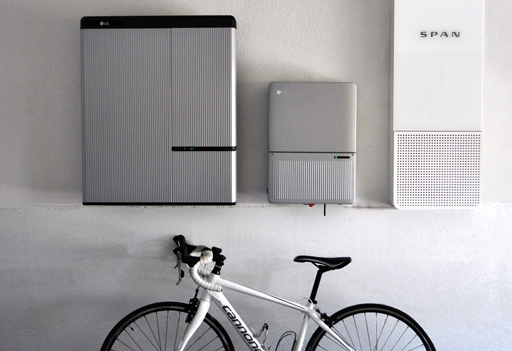Home energy start-up Span raises $10.2m
- June 2, 2020
- Steve Rogerson

Californian start-up Span has raised $10.2m to develop a home electrical panel that can optimise solar, energy storage and electric vehicle charging. The smart panel can increase resiliency with flexibility when the power goes out and real-time energy monitoring.
Span is led by executives and engineers from Tesla, Amazon Echo and Sunrun. The $10.2m series A round will be used to transform the electrical panel into an intelligent gateway for homes and expand the adoption of solar, energy storage and electric vehicles. The smart panel provides intuitive monitoring and controls for all circuits alongside flexibility for battery backup during power outages.
“Self-sufficiency and control within the home are top-of-mind for many homeowners with power outage concerns now compounded by coronavirus shelter-in-place orders,” said Span founder and CEO Arch Rao, who formerly led the product team at Tesla Energy for the Powerwall. “Last fall, power outages affected millions in California, and shutoffs are starting again as utilities perform precautionary maintenance in fire-risk areas. We developed the Span smart panel to give homeowners greater energy independence in the face of these growing challenges. With Span, they have greater control over their home energy, especially when they need it most.”
Delivering more than the passive current protection of the traditional electrical panels found in every home, the smart panel enables digital automation of home energy and more streamlined installations for clean energy upgrades.
The panel provides monitoring and control for 32 circuits, all managed through a smartphone interface. When the power goes out, it automatically islands the house and allows homeowners to select what parts of their homes they want to power, going beyond existing methods that are limited to covering just a few critical loads.
The panel is listed to UL standards that mirror this step-change in functionality: UL standard 67 for the regular electrical panel as well as UL 916 for energy management equipment and UL 869A for service equipment.
For installers performing solar and storage installations, the panel reduces labour by streamlining the total number of components. Early estimates indicate the installation time to be 50 per cent faster, resulting in fewer components required and a smaller, more streamlined overall installation.
The series A round was led by ArcTern Ventures and joined by Capricorn Investment Group, Incite Ventures and existing investors. Nest co-founder Matt Rogers joined the funding round through Incite Ventures.
“We founded Nest to reinvent the largest energy user at home, the thermostat,” said Rogers. “We replaced an ugly household device with something that invited interaction and saved energy. Span has the potential to solve that for every load in the home. That’s why I’ve come on board as an investor to Span and an advisor to Arch.”
Span’s new investors join a strong base of existing investors, including Wireframe Ventures, Congruent Ventures, Ulu Ventures, Energy Foundry, Hardware Club, 1/0 Capital and Wells Fargo Strategic Capital.
Since launching the product in late 2019, the company has seen significant demand in the residential market from solar plus storage installers, homebuilders, energy companies and homeowners. Funding will be used to meet this demand and scale Span’s panel to households across the USA.
Managing partner at ArcTern Ventures Murray McCaig sees massive potential for Span’s technology to scale and improve how solar and storage can work for homes.
“We see an incredible opportunity in the solar-plus-storage market, one that Span is extremely well-positioned to capitalise on,” said McCaig. “Span combines this opportunity with an exceptional team and a deep understanding of the market.”
Dipender Saluja, managing director at Capricorn Investment Group’s technology impact fund and an early investor in Tesla, sees Span’s combination of engineering innovation and consumer focus as a strong parallel.
“We have seen the tremendous impact new hardware technologies can have in transforming incumbent industries,” said Saluja. “I am excited to partner with Arch to deliver a much needed revolution to electrical infrastructure and the distributed energy market.”
Existing investors are aligned around a similar drive to help scale the growing solar and storage market. Paul Straub of Wireframe Ventures led Span’s seed round investment and sees Span as a critical next step to advance distributed clean energy.
“Span seamlessly integrates into the home and helps consumers get the most out of solar and storage,” said Straub. “It will play a central role as more homeowners seek clean energy, flexible backup power, greater resiliency and easy control of their homes.”
In addition to the new investment round, Mary Powell, former CEO of Vermont utility Green Mountain Power, will join Span’s board as an independent member.
“Mary Powell is one of the most forward-thinking energy executives I’ve had the privilege of working with,” said Rao. “She set an example of what a customer-focused utility could look like, bringing the Tesla Powerwall to thousands of customers in the state of Vermont. I’m excited to work with her again as we bring our panel to market.”
Span has established channel partnerships with solar and storage installers, as well as battery storage providers such as LG Chem to commercialise the product. Span is focused initially on California and Hawaii as key markets, both states with high rates of solar and battery storage adoption, with plans to expand more broadly in the USA this year.




